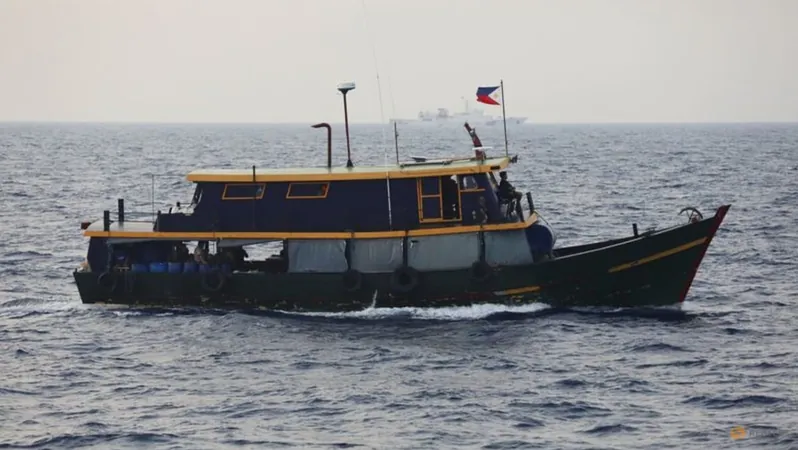
Philippines Faces Rising Pressure from China Over South China Sea Sovereignty
2024-11-12
Author: Ming
CANBERRA: Tensions continue to escalate in the South China Sea as the Philippines grapples with increasing pressure from China to relinquish its sovereign claims in the region.
This alarming update was shared by Defense Secretary Gilberto Teodoro following discussions with Australian Defense Minister Richard Marles in Canberra.
Strengthening Security Ties
Teodoro's statements signal a turning point in the relationship between the nations as they seek to strengthen their security ties amidst shared concerns over China's aggressive maneuvers in contested waters.
"What we see is an increasing demand by Beijing for us to concede our sovereign rights in the area," Teodoro stated, describing the Philippines as a "victim of Chinese aggression."
Strategic Partnerships
In an effort to fortify their alliance, the Philippines and Australia signed a strategic partnership in September 2023 and conducted their first joint sea and air patrols in the South China Sea shortly thereafter.
Furthermore, Manila participated in military exercises in Australia for the first time this year, showcasing a commitment to collaborative defense initiatives.
Rising Tensions With China
The escalating conflict has seen both nations raising their voices against China's assertiveness.
A Chinese foreign ministry spokesperson argued that Beijing's actions were in response to what they perceive as Philippine provocations, stating, "If the Philippines no longer infringes and provokes, there will be no more escalation of the maritime situation."
Contentious Territorial Claims
In recent developments, China announced the establishment of a "baseline" of territorial waters around the Scarborough Shoal, a particularly contentious area in the South China Sea.
This move has driven the Philippines to officially contest China's claims, asserting that such actions violate its sovereignty.
Condemnation of Chinese Actions
Statements from Manila's national maritime council condemned China's new baselines as a continuation of its previous illegal occupation of the shoal, which has been a focal point of dispute since China's aggressive seizure in 2012.
Intensified Maritime Patrols
Adding to the turbulence, Chinese maritime patrols in the South China Sea have intensified, with reports from the state-backed Global Times indicating the deployment of advanced vessels designed for longer patrols and rigorous enforcement of China's claims.
This substantial naval presence has raised alarms in the Philippines, particularly as new laws have been introduced to safeguard its maritime rights.
Historical Context
Historically, China has laid claim to nearly the entire South China Sea, a vital trade route accounting for over $3 trillion in annual shipping commerce.
However, a 2016 ruling from the Permanent Court of Arbitration declared China's claims to have no legal basis, a ruling that Beijing has consistently rejected.
International Law and Defense Initiatives
Teodoro highlighted that China’s actions are in direct contradiction to international law, emphasizing that the Philippines' defense partnerships with nations like Australia are vital in deterring further incursions.
Future Defense Investments
To bolster its military capabilities amidst these rising threats, the Philippines plans a substantial investment of at least $33 billion in new defense assets, including state-of-the-art fighter jets and advanced missile systems.
Australia's Commitment
Looking ahead, Australia is eager to enhance its collaboration with the Philippine defense sector, with plans to dispatch an engineering assessment team early next year—a move that underscores their mutual commitment to regional stability and security.
Conclusion
The unfolding events in the South China Sea represent a critical flashpoint that will undoubtedly shape diplomatic and military strategies in the region for years to come.



 Brasil (PT)
Brasil (PT)
 Canada (EN)
Canada (EN)
 Chile (ES)
Chile (ES)
 España (ES)
España (ES)
 France (FR)
France (FR)
 Hong Kong (EN)
Hong Kong (EN)
 Italia (IT)
Italia (IT)
 日本 (JA)
日本 (JA)
 Magyarország (HU)
Magyarország (HU)
 Norge (NO)
Norge (NO)
 Polska (PL)
Polska (PL)
 Schweiz (DE)
Schweiz (DE)
 Singapore (EN)
Singapore (EN)
 Sverige (SV)
Sverige (SV)
 Suomi (FI)
Suomi (FI)
 Türkiye (TR)
Türkiye (TR)